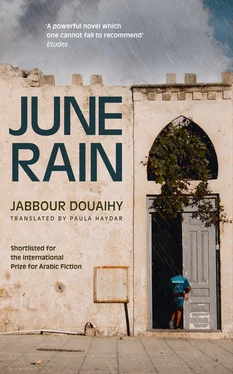The mix-up between the two events made Eliyya smile.
The man began another inventory of news about Brazil that was as colourful as the parrot’s feathers. Eliyya raised his voice a little to express his displeasure, laughing about the deliberate misunderstanding.
‘The incident, here, what did you see? Where were you? I’m told you saw everything, is that true?’
The shopkeeper tried to gain some time. He stopped telling his story about Brazil and the parrot.
‘Come inside, please. It’s cooler inside the shop.’
He went back to his place behind the scales. He felt secure behind his barricade.
‘Saint Michael’s wing was hit by a 14-caliber bullet, and Saint Joseph got a bullet in his eye. Another bullet hit the prayer book, which saved the life of Father Antonios who was holding the thick book in his hands. The bishop’s staff was thrown to the floor and we only sent it to him two days later, when the bishop’s steward came looking for it. Whoever tells you the Eucharist holder was hit, you tell him he’s a liar. I saw it with my own eyes. It’s true that the confessional was riddled with bullets, and they say there was someone hiding in there who started firing in all directions…’
Eliyya was unconvinced.
The man jumped to his feet. ‘Come.’ He asked Eliyya to come inside.
‘Here, sit in my place.’
Eliyya hesitated.
‘Sit here on the chair.’
Eliyya sat obediently, crossing his arms.
‘I was sitting right here on that damned Sunday. What can you see?’
Eliyya looked outside. The church door and the middle section of the square. That was all.
‘Everyone said, “Oh God, help me !”’ the shopkeeper said.
‘Who was standing here in the shop?’ Eliyya asked suddenly.
‘Your father was here with another young man from your family…’
Eliyya interrupted him abruptly. ‘How did you know who I am?’
‘I’m more than seventy years old, my son…’
‘So…’
Eliyya was alarmed for a moment. It was as though there was an eye from above watching him and following him. Soon, however, he became aware of the presence of the taxi driver. He was asleep, stretched back in the driver’s seat, snoring under the shade of the eucalyptus tree. The discovery made Eliyya feel at ease.
‘The taxi driver must have told you…’
The shopkeeper continued without commenting, which confirmed Eliyya’s suspicion. ‘There was a photographer who approached your father and his friend and offered to take their picture. I remember that your father put a cigarette in his mouth to pose for the picture. It was the fashion in those days. Young men always posed for pictures with cigarettes dangling from their mouths. I’m not hiding anything. I’m telling you what I saw. But a few minutes later the bullets started to fly and so I hid behind the shop front and when I looked up the shop was empty…’
There are some stories you listen to and you can tell they’re missing something and that whoever is telling them knows more than he is letting on. Hand gestures and eye movements. The shopkeeper, born of a marriage-happy father and a Brazilian mother, loved to spice up his stories. That was part of his nature.
‘My son, there were people who were killed by their own relatives’ bullets…’ Then he added with a whisper, ‘or their friends’ bullets…’
Eliyya turned towards him, and so the man continued. ‘At any rate, don’t believe everything you hear.’
That was what everyone advised.
The shopkeeper finished eating the okra and rice and drank the last sips of the glass of arak on the table in front of him while Eliyya cast a last glance at the square.
On the way back, the taxi driver stayed silent, but he kept glancing up at Eliyya in his mirror every time he rounded a sharp bend or had to stop.
The houses of the commoners, who were the vast majority, were small and poor, mostly consisting of one or two rooms and an outhouse. They were piled up on top of each other in cramped neighbourhoods, low, damp houses with adobe roofs that required flattening with a stone roller in the winter to prevent leaks and on which springtime grass sprouted up in the month of May.
At the turn of the twentieth century, one of the notables built a three-story house out of sandstone, which he was able to pay for, most probably, from money he earned when he first emigrated. The family, rather self-importantly, called it Al-Amaara (The Edifice). They had owned another spacious and imposing house before that which they called Al-Kubra , (The Grand). Built by one of their elders more than a century before, it had high arched ceilings, and in the 1940s the government could not find a more spacious accommodation for its head office.
In the family’s view, the great houses were not just a matter of chiselled stone, double and triple archways and arcades, and French Honeybee red tiled roofs that were added later on. That style was imitated by anyone who managed to amass a small fortune either through emigration or by smuggling hashish across the roads of the Beqaa Valley that led to the sea, or by those who were contracted by the post-Independence government to do public works. Rather, a great house meant a high, open door, a generous meal, and a willingness to put up with the commoners and their ignorance, rough appearances, naïve questions and endless exuberance, simple folk who were content to sit in the presence of those families, simply listening to what they said and watching the little things they did.
These houses were an unavoidable stop for literati or pilgrims who were sent to the East from Europe. If they worked for the Ministry of Foreign Affairs, they would include in their report a special reference to them, or highlight them in literary accounts of their trip telling of the hospitality and generosity of the house’s family and how they used gold-plated forks and knives when they ate, a rarity in the East.
The owners of these great houses also had Ottoman titles, the most important of which was ‘Bey’ and the rarest, ‘Pasha’. They were granted these titles through a decree signed by Moulay Sultan Abdel Hamid and were required to meet with a minister from Istanbul to receive them. They were kept in a locked drawer along with property deeds and money, which was sometimes rumoured to have come from extortion payments or loan repayments. Some of these monies were later donated to the Maronite Charitable Endowment in a moment of weakness or out of gratitude for being healed of an incurable disease.
An oilpainting of the house’s patriarch and founder was prominently displayed in the main part of the house. He had tender features and was wearing a city suit, which looked more like a coastal city businessman’s suit than that of a notable. On either side of the big painting were photographs of women sporting stylish hats and playing tennis when the game had first been introduced into the country. Also hanging on the wall was the family tree which extended into a past so distant and glorious it was implausible, a family tree which some Maronite monk who was a friend of the family had worked tirelessly to construct and revise.
The great house also meant a vast tract of land and threshing floors for wheat and an olive press and a foreign nanny for the children. And sometimes, a small church where they celebrated mass on Sundays with friends and where they were buried. And wives, beautiful or otherwise, but always rich, from other notable families in Mount Lebanon that were no less important and wealthy. Naturally, it was only a matter of time before disagreements between the wives’ brothers cropped up, over how to divide up the inheritance in light of the great families’ determination to exclude daughters from inheriting in order to restrict ownership to males.
Читать дальше












